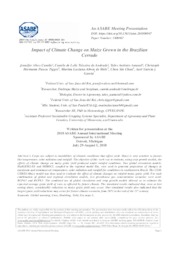Impact of climate change on maize grown in the brazilian cerrado.
Impact of climate change on maize grown in the brazilian cerrado.
Author(s): CAMILO, J. A.; ANDRADE, C. de L. T. de; AMARAL, T. A.; TIGGES, C. H. P.; MELO, M. L. A. de; CHAN, C. S.; GARCIA Y GARCIA, A.
Summary: Crops are subject to instabilities of climatic conditions that affect yield. Maize is very sensitive to factors like temperature, solar radiation and rainfall. The objective of this work was to evaluate, using crop growth models, the effects of climate change on maize grain yield produced under rainfed conditions. Two global circulation models, HadGEM2-ES and MIROC5, coupled to the regional model Eta, were used to generate projections of changes in maximum and minimum air temperature, solar radiation and rainfall for conditions in southeastern Brazil. The CSM-CERES-Maize model was then used to evaluate the effect of climate changes on rainfed maize grain yield. For each combination of global and regional circulation models, two greenhouse gas concentration scenarios were used: RCP4.5 and RCP8.5. The combined use of global circulation and crop growth models allowed us to estimate the expected average grain yield of corn as affected by future climate. The simulated results indicated that, even at best sowing dates, considerable reduction in maize grain yield may occur. Our simulated results also indicated that the largest grain yield reductions may occur for future climate scenarios from 2071 to the end of the 21st century.
Publication year: 2018
Types of publication: Paper in annals and proceedings
Unit: Embrapa Maize & Sorghum
Keywords: Aquecimento, Aquecimento global, Models, Rendimento, Zea Mays
Observation
Some of Embrapa's publications are published as ePub files. To read them, use or download one of the following free software options to your computer or mobile device. Android: Google Play Books; IOS: iBooks; Windows and Linux: Calibre.
Access other publications
Access the Agricultural Research Database (BDPA) to consult Embrapa's full library collection and records.
Visit Embrapa Bookstore to purchase books and other publications sold by Embrapa.

